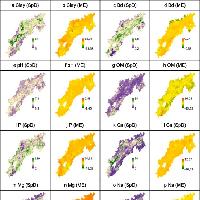Resumen
- Advances in science and technology combined with the need to handle and manage natural resources have resulted in a gradual increase in soil data availability. This has allowed characterizing, describing, or proposing projects to address issues such as soil degradation, agricultural productivity, threats, and ecosystem services. Despite the availability of soil data, users are increasingly looking for additional, timely, and reliable information in order to respond to current and future situations, such as food security and climate change. IRAKA is a soil information system for the Colombian Cundiboyacense high plateau and the first to provide additional information from available official sources. It has a modular design based on the organization of a soil database whose structure incorporated 299 profiles, 1432 samples, and 55 properties and the integration, harmonization, and standardization of 8 soil surveys conducted in the area. The structured information enabled modeling and validating physical and chemical properties through digital soil mapping and comparing different machine learning techniques, including random forest, ranger, support vector machine, and ensemble models of these techniques. The interpolations of 11 quantitative properties and 1 qualitative property resulted in acceptable coefficients of goodness of fit due to different factors: property variability, representativeness, distribution in the study area, and property description based on environmental covariates. All the information generated has been made available for widespread use across different geographic web services. Thus IRAKA contributes to the management of information and knowledge through techniques and tools that allow users to visualize new information, use the information, and draw attention to new studies and improve databases in which the confidence level is insufficient and does not allow decision making.
